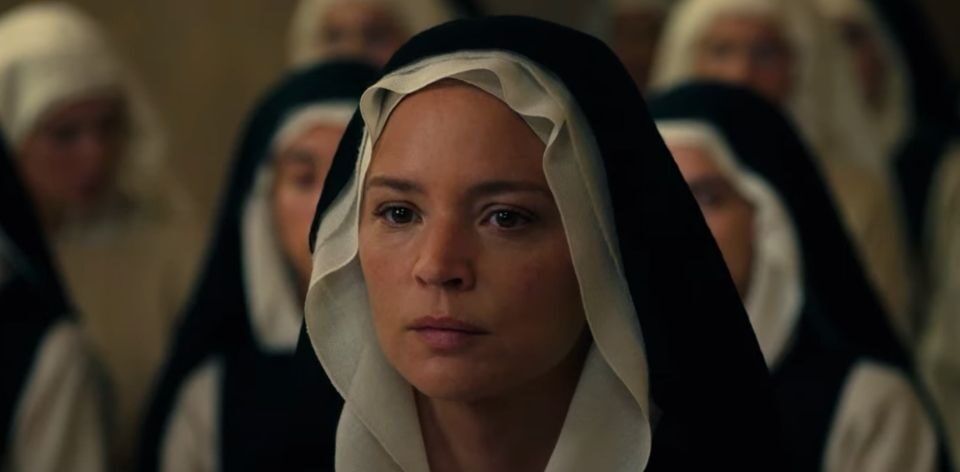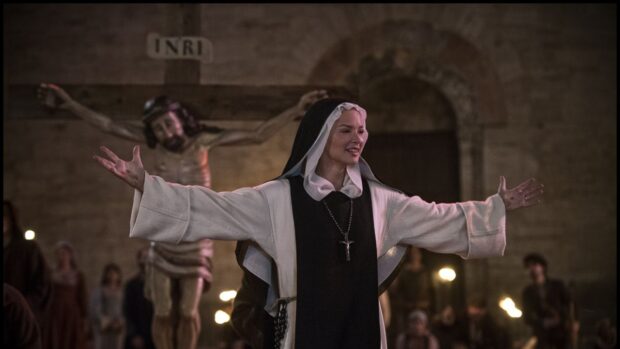Whatever your thoughts about Paul Verhoeven, they’re probably wrong. They are also absolutely on the money. Verhoeven tends to get a reputation as a purveyor of ultraviolence and winking parody at the Hollywood system. Which is true, and Robocop, Total Recall and Starship Troopers are primary evidence.
Your version of Verhoeven might be that of an arthouse director. Since 2006, he’s returned to Europe, earning critical acclaim on Black Book (2006) and Elle (2017), tracing a lineage back to his early shorts inspired by the French New Wave and his seminal works of Dutch cinema from Business Is Business (1971) to The Fourth Man (1983). Or you might just share my belief that Showgirls is one of the finest films of the 20th century.
BENEDETTA is a film that reminds us that all of those intersecting things exist in this single filmmaker. Set in the 17th century, it’s based on the true story of Benedetta Carlini (Virginie Efira), raised in a convent to be a nun. Under the eye of The Abbess (Charlotte Rampling), she grows into her devout faith, filled with disturbing and erotic visions of Jesus Christ appearing directly to her.
The arrival of novice nun Bartolomea (Daphne Patakia) triggers an awareness of her own sexuality. As her visions intensify, Benedetta exhibits stigmata and is hailed as a saintly figure by the local abbot. As a sexual relationship develops with Bartolomea, a series of events – including plague ravaging the surrounding townships – culminates in suspicion cast upon Benedetta’s saintliness.
Beautifully shot (by BPM’s Jeanne Lapoirie) and engagingly told, the film mostly avoids being too ‘male gazey’ despite the plethora of nudity and centrepiece sex scene. Verhoeven may have a reputation for exploitation, but if you look at his past works – especially Katie Tippel (1975) and more recently Elle – the intention appears to be one of female empowerment. Whether Verhoeven is the one who should be telling these stories, or if he is successful in doing so, probably requires a level of objectivity few of us are able to bring to a film in 2021.
At times, it is unnecessarily cruel: there’s one torture scene that goes way too far in the wrong direction. At other moments, it briefly achieves its aim of being a biting examination of the conflict between female sexuality, a male dominated religious leadership and personal faith. Cutaways to fantasy sequences in which a dreamy Jesus seduces Bendetta might earn the side-eye of the placard makers, but they add a dimensionality to a film that could have easily been single note exploitation. One suspects it may improve on repeat viewings.
At the time of writing, there are protests at various locations across the US for the ‘blasphemy’ its opponents feel it has caused. BENEDETTA doesn’t do enough to earn this ire, and in fact Verhoeven and David Birke’s screenplay mostly explores a historical version of moral panic. So, in the end the film may not blaspheme or revolutionise, but it may follow the same path as the real Carlini, returning to a quiet and secluded life to become just another piece of a larger body of work.
2021 | France, Netherlands | DIRECTOR: Paul Verhoeven | WRITER: David Birke, Paul Verhoeven | CAST: Virginie Efira, Lambert Wilson, Daphne Patakia, Olivier Rabourdin, Clotilde Courau, Charlotte Rampling, Hervé Pierre | DISTRIBUTOR: Pathé Distribution (US), Hi Gloss Entertainment and Vendetta Films (AUS) | RUNNING TIME: 131 minutes | RELEASE DATE: 9 July 2021 (France), 8 September 2021 (US)






